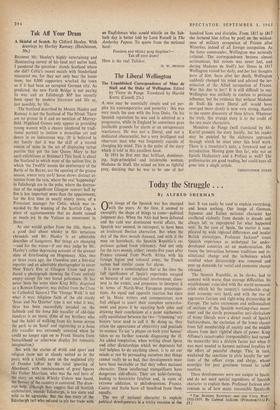Tak Aff Your Dram
READING Mr. Hanley's highly entertaining and illuminating survey of his (and my) native land, I pondered the question: stands Scotland where she did? Celtic's recent match with Sunderland reassured me, for they not only beat the home team, but 8,000 supporters wrecked the town as if it had been an occupied German city. As predicted, the new Forth Bridge is not paying its way and an Edinburgh MP has recently been upset by modern literature and life or, just possibly, by life.
The Scotland described by Messrs. Hanley and Ramsay is not the Scotland of The Hirsel. There
are no grouse in it and no mention of Murray- field. Highland Games only appear as providing young women with a chance (deplored by tradi- tional purists) to imitate a masculine art and dance in an indecorous way. (It is believed in my family that it was the skill of a second cousin of mine in the art of displaying tartan panties that got the late Queen Mary to bar• such exhibitions at Braemar.) This book is about the Scotland in which most of the natives live, in which 'the Twelfth' means the anniversary of the Battle of the Boyne, not the opening of the grouse season, where very un-U horse shows distract at- tention from the rain, where the real `happenings' in Edinburgh are in the pubs, where the destruc- tion of the magnificent Glasgow concert hall by fire is less important news than the appointment, for the first time in nearly ninety years, of a Protestant manager for Celtic, which was re- warded by the winning of the Scottish Cup, a piece of aggiornamento that no doubt caused as much- joy in the Vatican as resentment in Ibrox.
As one would gather from the title, there is a good deal about whisky in this veracious chronicle and Mr. Hanley is an admirable describer of hangovers. But things are changing —and for the worse—if one may judge by Mr. Hanley's rather depressing account of the present state of first-footing on Hogmanay. Alas, two or three years ago, the Guardian sent a five-star reporter and an admirable photographer to cover New Year's Eve at Glasgow Cross and pro- duced a photograph showing the Cross entirely empty except for two bored policemen. (It has never been the same since King Billy, disguised as a Roman Emperor, was shifted from the Cross to Cathedral Square.) The 'Orange Walk' is not what it was; religious faith of the old sturdy `Jesus and No Quarter' type is not what it was; Skye has been successfully invaded on the Sabbath and the bona Me traveller of old-time Sundays is no more. (One of my brothers who had the habit of walking from his house across the park to an `hotel' and registering as a bona fide traveller was extremely annoyed when he could no longer sign on as Frank Sinatra from Samarkhand or otherwise display his romantic imagination.) But with the stories of drink and sport and religion (now not as closely united as in the past), with a kindly note on the neglected city of Dundee (offset by the total ignoring of Aberdeen), with reminiscences of great figures like Father Morrison, who was the real hero of the story on which Whisky Galore was based, the flavour of the country is conveyed. The draw- ings help, although they suggest that all Scottish architecture, outside Edinburgh, is too stern and wild to be agreeable. But the fine story of the Edinburgh tart who refused to ply her trade with an Englishman who would whistle on the Sab- bath day is better told by Lord Russell in The Amberley Papers. To quote from the national bard:
Freedom and whisky gang thegither!— Tak aft your dram!
Here is the real Talisker.
D. W. BROGAN






























 Previous page
Previous page